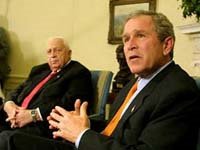Quote of the Day: "It was like, 'Whoa, where did that come from?' "

That quote came from an anonymous individual who was present in March 2001 at an Oval Office meeting between President Bush and Israeli Prime Minister Ariel Sharon. And the comment was made in reference to a promise that Mr. Bush made to Mr. Sharon on that day.
So, you ask, what was that promise?
The first President Bush had been tough on Israel, especially the Israeli settlements in occupied lands that Mr. Sharon had helped develop. But over tea in the Oval Office that day in March 2001 — six months before the Sept. 11 attacks tightened their bond — the new president signaled a strong predisposition to support Israel.
“He told Sharon in that first meeting that I’ll use force to protect Israel, which was kind of a shock to everybody,” said one person present, given anonymity to speak about a private conversation. “It was like, ‘Whoa, where did that come from?’ “
That's right, President George "Dubya" Bush made a promise quite unlike any made before when it came to Israel, a promise that his father knew to steer far clear of during his own presidency over a decade earlier. And, one must note, this historically significant promise came a full six months prior to the infamous terror attacks of 9/11/01. Bush had been in office a mere two months when he decided to throw all caution to the wind.
What in the hell was he thinking?
That embrace of Israel represents a generational and philosophical divide between the Bushes, one that is exacerbating the friction that has been building between their camps of advisers and loyalists over foreign policy more generally. As the president continues to stand by Israel in its campaign against Hezbollah — even after a weekend attack that left many Lebanese civilians dead and provoked international condemnation — some advisers to the father are expressing deep unease with the Israel policies of the son.
“The current approach simply is not leading toward a solution to the crisis, or even a winding down of the crisis,” said Richard N. Haass, who advised the first President Bush on the Middle East and worked as a senior State Department official in the current president’s first term. “There are times at which a hands-off policy can be justified. It’s not obvious to me that this is one of them.”
Unlike the first President Bush, who viewed himself as a neutral arbiter in the delicate politics of the Middle East, the current president sees his role through the prism of the fight against terrorism. This President Bush, unlike his father, also has deep roots in the evangelical Christian community, a staunchly pro-Israeli component of his conservative Republican base.
The first President Bush came to the Oval Office with long diplomatic experience, strong ties to Arab leaders and a realpolitik view that held the United States should pursue its own strategic interests, not high-minded goals like democracy, even if it meant negotiating with undemocratic governments like Syria and Iran.
The current President Bush has practically cut off Syria and Iran, overlaying his fight against terrorism with the aim of creating what Secretary of State Condoleezza Rice calls “a new Middle East.” In allying himself so closely with Israel, he has departed not just from his father’s approach but also from those of all his recent predecessors, who saw themselves first and foremost as brokers in the region.
This approach to the Middle East and Israel, in particular, bears all the markings of the PNAC neo-conservative movement headlined by the likes of William Kristol, Dick Cheney and Donald Rumsfeld. Their overtly militaristic approach to the world and the Middle East, especially, is manifested in the United States' involvements in Afghanistan and Iraq, and now in the Israelis' ongoing assault on Lebanon. Clearly, Syria and Iran are next on the their list of conquests, and the rest of the world may be virtually powerless to keep it from happening.
When former presidential aides - on both ends of the political spectrum - begin to seriously question the policies and motives of the current Bush administration, it's high time that the rest of us sit up and take notice. Any reasonable prospects for lasting peace in this crazy world of ours may, quite literally, hang in the balance.



0 Comments:
Post a Comment
<< Home